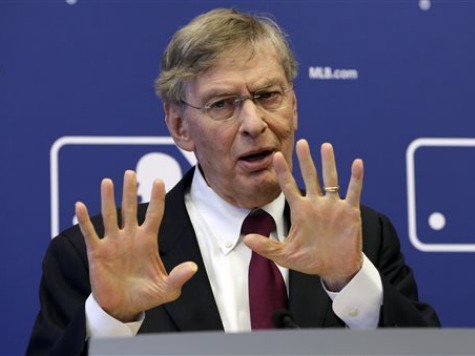The commissioner of Major League Baseball owes the very existence of his office to the insistence of the first man to hold it that the game needs a single person outside of it and above its internecine disputes to preside over it. In the ninety-four years since Kenesaw Mountain Landis traded a federal judgeship for the commissioner’s office, Major League Baseball has plucked Happy Chandler from the United States Senate, William Eckert from the ranks of retired Air Force generals, Peter Ueberroth from the business world, and A. Bartlett Giamatti from the Ivy League to run the organization.
Michael S. Schmidt reports in today’s New York Times that the current commissioner of baseball not only wants to select his successor, but he wants that successor to come from within the ranks of Major League Baseball, too. Selig’s handpicked choice is Rob Manfred, the chief operating officer of MLB. To ensure compliance with his wishes, the commissioner has reportedly conducted meetings in secret lacking input from his thirty bosses.
The heavy-handedness to install Rob Manfred has alienated one of Selig’s staunchest allies, Jerry Reinsdorf, owner of the Chicago White Sox. “What I have said about Rob is none of your business,” Reinsdorf told Schmidt, who noted that the 78-year-old owner had included profanity in his combative response. Schmidt talked to twenty sources among owners, executives, and league office employees for for his story, but Reinsdorf alone, tellingly, went on the record.
Schmidt writes:
The process to select the next commissioner and the palace intrigue it has sparked provide a window into how decisions are made in an organization led by Mr. Selig’s authoritative, intensely hands-on management style. Under his tenure, the sport’s revenue has grown exponentially, and it has had notable labor peace. His approach has garnered fierce loyalty from many owners and a sense of alienation among others, who have complained that only a select group, which meets confidentially with Mr. Selig, is allowed to be involved with the sport’s most important decisions.
But Selig isn’t the boss of the owners. They’re the boss of him. The fact that Selig, the former owner of the Milwaukee Brewers, sprang from their ranks surely makes his power grab startling to some former colleagues. He’s behaving as an owner rather than as an instrument of the owners.
Selig, like his recently retired NBA peer David Stern, increased revenues. He also eroded traditions. In a game steeped in them, this sets him apart from past commissioners. He abolished the presidencies of the two leagues, put umpires in a common MLB pool rather than attached to the leagues, established interleague play, and shifted Houston to the American and Milwaukee to the National. He rewarded the All-Star game winner home field advantage in the World Series, established the Wild Card, and instituted replay review. Is it any wonder one so contemptuous of his inheritance would preside over a drug-induced assault upon the record book?
When he retires at 80 sometime after the 2014 season, Bud Selig will have served just a few years short of the longevity mark of baseball’s first czar. Whereas Landis officiated over the game’s golden age, Selig oversaw strikes, steroids, and a slump in popularity vis-a-vis other team sports. Does that record reward him the right to name a successor?

COMMENTS
Please let us know if you're having issues with commenting.